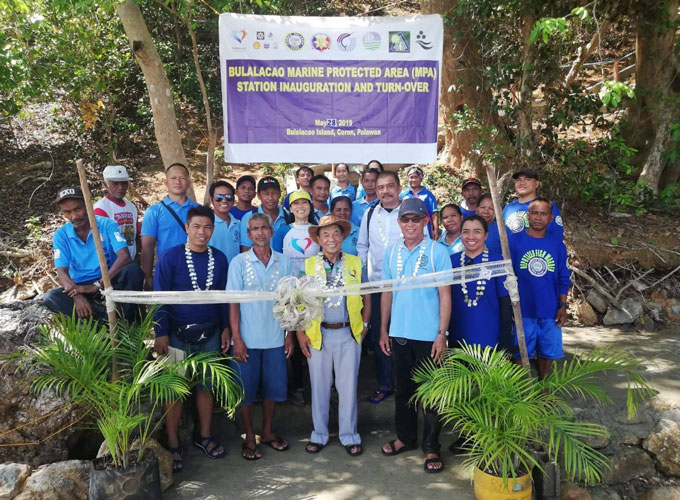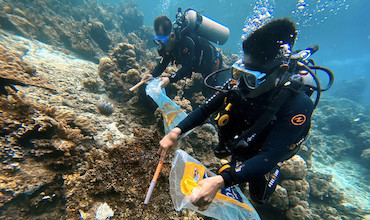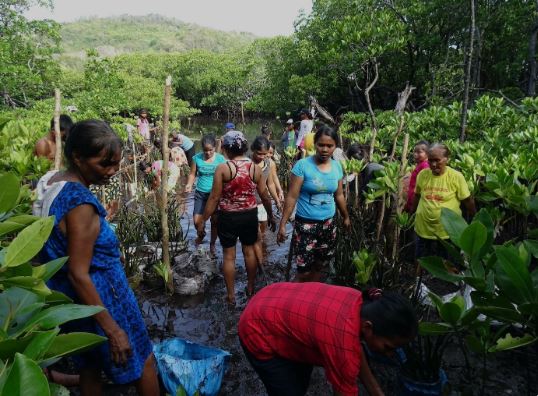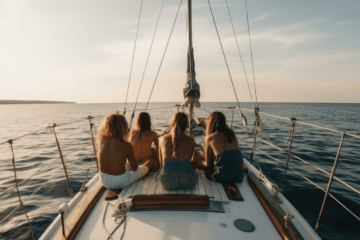Marine conservation efforts in Palawan, Philippines, are crucial to preserving the region’s rich marine biodiversity and ensuring the sustainability of its ecosystems.

Various organizations, government initiatives, and local communities actively participate in conservation projects.

Here’s a detailed list of marine conservation efforts in Palawan:
Table of Contents
1. Tubbataha Reefs Natural Park:
- Description:
- Tubbataha Reefs Natural Park is a UNESCO World Heritage Site and a marine protected area known for its pristine coral reefs.
- Efforts include strict regulations on fishing, diving, and other human activities to protect the delicate marine ecosystem.
2. Palawan Council for Sustainable Development (PCSD):
- Description:
- PCSD is a government agency responsible for implementing environmental laws and policies in Palawan.
- Engages in various enviromental projects, including sustainable resource management and community-based initiatives.
3. Community-Based Marine Sanctuaries:
- Description:
- Local communities in Palawan establish and manage marine sanctuaries to protect specific coastal areas.
- These sanctuaries often involve community patrols, habitat restoration, and sustainable fishing practices.
4. El Nido Resorts’ Eco-Friendly Initiatives:
- Description:
- El Nido Resorts, a group of sustainable island resorts, implements various eco-friendly practices.
- Initiatives include waste management, coral reef protection, and community engagement to promote responsible tourism.
5. Palawan NGO Network, Inc. (PNNI):
- Description:
- PNNI is a network of non-governmental organizations (NGOs) working on environmental and sustainable development in Palawan.
- Engages in advocacy, research, and community-based projects to address environmental issues.
6. Integrated Coastal Resource Management (ICRM) Programs:
- Description:
- ICRM programs focus on the holistic management of coastal resources, integrating ecological, social, and economic aspects.
- These programs often involve community participation, education, and sustainable livelihood projects.
7. Marine Protected Areas (MPAs):
- Description:
- Palawan has established numerous Marine Protected Areas to safeguard critical habitats and biodiversity.
- These areas often restrict certain activities to promote natural regeneration and sustainable use of marine resources.
8. Coral Reef Monitoring and Restoration:
- Description:
- Organizations and research institutions conduct coral reef monitoring to assess the health of coral ecosystems.
- Restoration projects involve transplanting corals, promoting coral resilience, and addressing threats like coral bleaching.
9. Philippine Reef and Rainforest Conservation Foundation, Inc. (PRRCFI):
- Description:
- PRRCFI is a non-profit organization dedicated to the protection of coral reefs and rainforests in the Philippines.
- Implements projects such as community-based resource management and environmental education.
10. Fisheries Management and Sustainable Practices:
- Description:
- Initiatives focus on promoting sustainable fishing practices, including the use of fishery management plans.
- Encourages responsible fishing methods to prevent overfishing and preserve marine biodiversity.
11. Sea Turtle Conservation Programs:
- Description:
- Organizations and communities run sea turtle conservation programs, protecting nesting sites and implementing hatchery initiatives.
- Education and awareness campaigns aim to reduce threats to sea turtles and their habitats.
12. Mangrove Conservation and Reforestation:
- Description:
- Mangrove areas are crucial for coastal protection and serve as nurseries for various marine species.
- Conservation efforts involve mangrove reforestation projects, community engagement, and sustainable use practices.
13. Climate Change Adaptation Strategies:
- Description:
- Climate change poses threats to marine ecosystems. Adaptation strategies include resilience-building measures, monitoring, and community awareness on climate-related issues.
14. Plastic Pollution Reduction Initiatives:
- Description:
- Campaigns and programs focus on reducing plastic pollution in marine environments.
- Efforts include community clean-ups, waste management projects, and education on the impacts of plastic pollution.
15. Collaboration with Indigenous Communities:
- Description:
- Collaboration with indigenous communities to integrate traditional knowledge into conservation practices.
- Recognizing and respecting the role of indigenous people in sustainable resource management.
16. Research and Environmental Education Programs:
- Description:
- Conservation organizations and educational institutions conduct research to understand local ecosystems.
- Environmental education programs raise awareness and foster a sense of responsibility for marine conservation.
Tips for Supporting Marine Conservation:
- Responsible Tourism: Choose eco-friendly accommodations and tour operators that prioritize sustainable practices.
- Reduce Single-Use Plastics: Minimize plastic consumption and participate in beach clean-up activities.
- Support Local Initiatives: Contribute to local conservation projects through volunteering, donations, or responsible tourism activities.
- Educate and Raise Awareness: Spread awareness about marine conservation and engage in educational initiatives.
- Respect Local Regulations: Follow guidelines and regulations set by marine protected areas and conservation organizations.
Marine conservation efforts in Palawan are essential for preserving the unique marine ecosystems and ensuring the long-term sustainability of the region.

By actively participating in or supporting these initiatives, individuals can contribute to the protection of Palawan’s marine biodiversity and promote responsible environmental practices.


